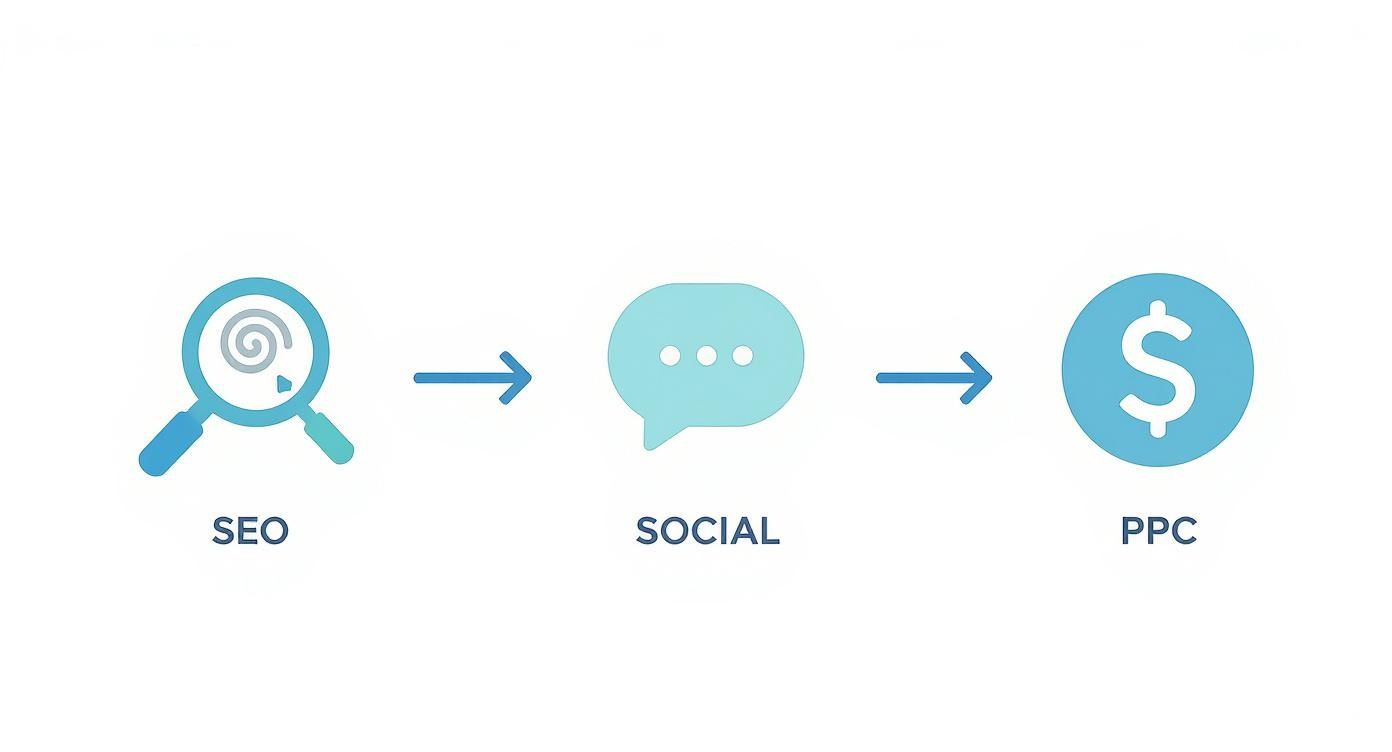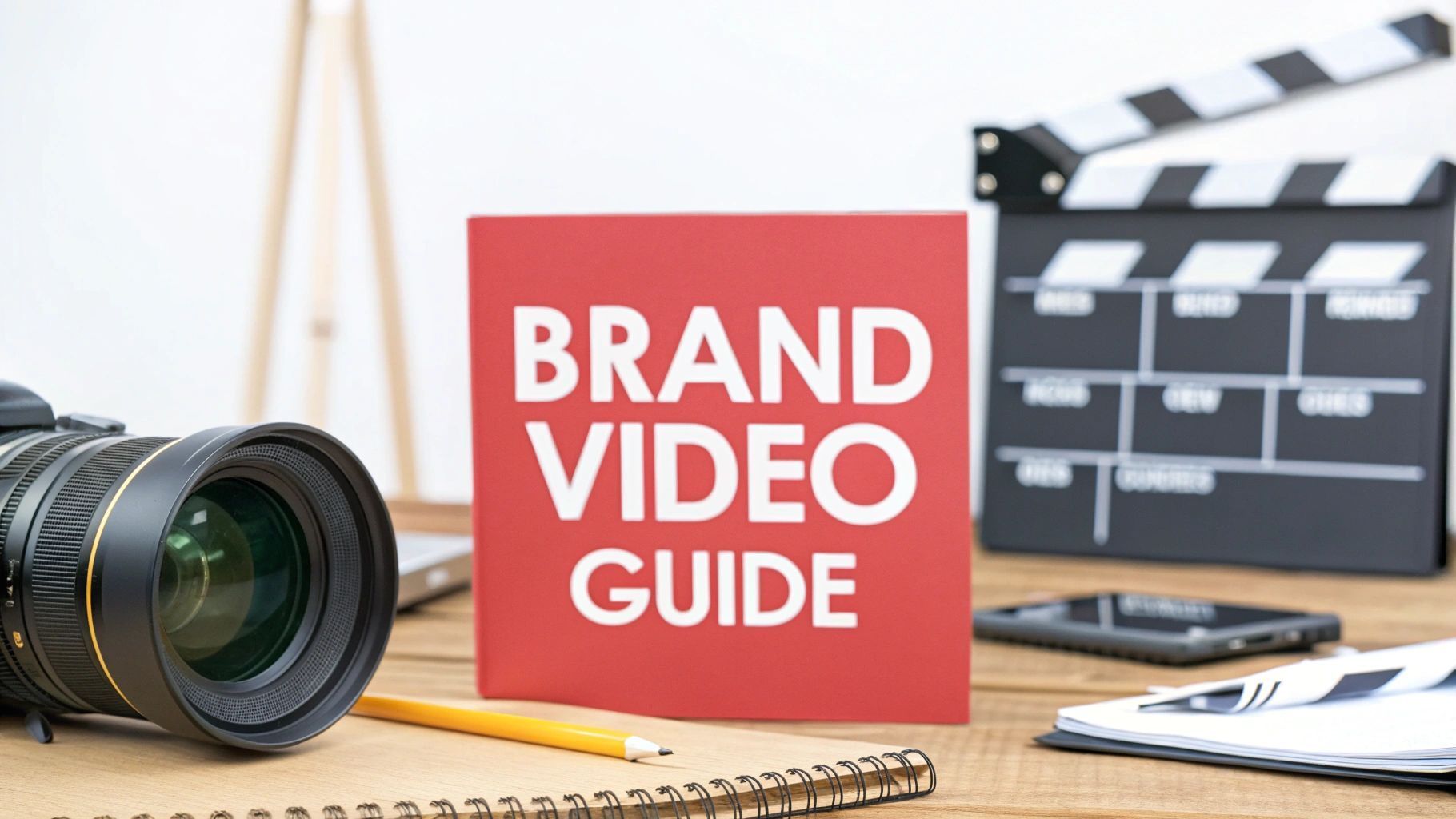What does a marketing agency do: a quick guide
So, you've heard the term ‘marketing agency’ thrown around, but what does it actually mean for your business?
In short, a marketing agency is your outsourced team of experts, brought in to plan, build, and run the marketing strategies that grow your brand and, most importantly, your revenue. Think of them as a specialist department you can plug into your business, filled with skills your in-house team might not have yet.
What Exactly Does a Marketing Agency Do?

Almost every business owner hits a wall wondering how to find new customers without just throwing money at the problem. A marketing agency is the partner that steps in to solve that puzzle. Their job is to get your message heard by the people who need to hear it.
They bring a fresh pair of eyes. Because they’re not caught up in your day to day operations, they can take a step back, analyse the market, pinpoint your ideal customer, and build a solid plan to connect with them. This always starts with deep-diving into your industry, your audience, and what your competitors are up to.
Core Functions and Objectives
An agency’s work isn’t about making things look pretty or getting a few likes on social media. Everything they do is tied to real, measurable business goals. Their actions are deliberate and driven by data, not guesswork.
The goal is brutally simple: grow your business . An agency gets this done by blending creative thinking with sharp analytics, making sure every pound you spend on marketing delivers a clear return.
They orchestrate campaigns across different channels, making sure everything works together as part of a single, coherent strategy. This usually involves:
- Brand Development: Nailing down your company’s voice, style, and core message so you stand out.
- Lead Generation: Building systems that consistently attract and capture potential customers.
- Customer Engagement: Creating real relationships with your audience through valuable content and genuine interaction.
- Revenue Growth: Directly connecting marketing activity to more sales and better profits.
By taking on these heavy-lifting tasks, an agency gives you the freedom to get back to what you do best—running your business.
The Blueprint for Building Your Brand's Strategy

Before a single penny is spent on adverts or a social media post is even drafted, a great marketing agency plays the role of an architect for your growth. They don’t just dive into tactics; they start by designing a comprehensive blueprint for your business, making sure every single action has a clear purpose.
This all starts with a deep dive into your world. The agency will get stuck into proper market research to get a feel for industry trends, run a competitor analysis to spot gaps and opportunities, and build out detailed profiles of your ideal customers. It’s about asking the big, important questions first.
Translating Goals into Actionable Plans
Where an agency really shows its worth is in turning your business objectives into a tangible marketing plan. A goal like "increase sales by 20% " isn't just a number; it gets translated into specific, measurable actions.
This usually means a multi-channel approach where everything works together:
- Search Engine Optimisation (SEO) is put to work to capture people who are actively looking for what you offer.
- Content Marketing builds trust and positions you as an authority by answering your audience's biggest questions.
- Paid Advertising targets specific demographics to bring in immediate leads and get your name out there.
This joined-up approach is absolutely vital. You can get a better handle on building this foundation by reading our guide to creating a digital marketing strategy that will boost your business. This framework ensures every piece of content, every email, and every social post is pulling in the same direction.
An agency doesn't just make marketing materials. It engineers a system where each part supports the others, building the kind of momentum that drives real, sustainable growth.
The demand for this kind of strategic thinking is only going up. In the UK, digital agencies have seen a compound annual growth rate of 7.2% since 2019. The industry’s revenue is on track to hit a massive £20.4 billion by 2025, which shows just how much businesses value expert guidance. This kind of growth proves that a solid blueprint isn't a nice to have anymore—it's essential.
The Core Services That Drive Real Results
A marketing agency is ultimately judged on the results it delivers. Those results come from a toolkit of specialised services, each designed to solve a specific business problem—from getting your brand noticed in the first place to turning casual browsers into loyal customers.
Think of it as a workshop. You wouldn't use a sledgehammer to hang a picture, right? The same logic applies here. Every tool has its purpose.
For instance, Search Engine Optimisation (SEO) is all about making your website impossible to ignore on search engines like Google. When someone searches for what you sell, a solid SEO strategy puts you right at the top of the page, pulling in valuable traffic without you paying for every click. It’s a marathon, not a sprint, but it builds incredible long term value.
On the flip side, you have pay per click (PPC) advertising . This is the sprinter. It’s about paying for adverts to appear instantly at the top of search results or on social media feeds. It’s a fantastic way to get leads in the door quickly while your other, slower-burning strategies start to gather steam.
This screenshot from Wikipedia gives you a sense of the sheer variety of agencies out there, from digital specialists to traditional media powerhouses.
As the list shows, agencies often find their niche, which is great for businesses looking for a specific kind of expertise.
Building Your Brand's Voice and Community
But it's not all about driving traffic. The best agencies know how to build genuine connections. Content marketing is where this really comes to life. It’s the art of creating genuinely useful articles, videos, and guides that position your business as the go-to expert in your field. If you want to see how deep these strategies can go, exploring an industry blog like v30.ai's blog for marketing insights can offer some great real world examples.
Then there’s social media management , which is all about building a community on platforms like Instagram, LinkedIn, and Facebook. This isn't just about posting updates and walking away; it’s about starting conversations and building real relationships with the people who matter to your brand.
A Breakdown of Common Marketing Agency Services
To make things clearer, here’s a quick look at some of the most common services, what they aim to do, and what you can expect from them.
| Service | Objective | Typical Deliverable |
|---|---|---|
| SEO | Increase organic visibility on search engines. | Higher search rankings, increased website traffic. |
| PPC Advertising | Drive immediate, targeted traffic and leads. | Ad campaigns on Google or social media, landing pages. |
| Content Marketing | Build authority, trust, and audience engagement. | Blog posts, articles, videos, whitepapers. |
| Social Media | Grow brand presence and community online. | Platform management, content creation, follower growth. |
| Email Marketing | Nurture leads and retain existing customers. | Automated email sequences, newsletters, promotional campaigns. |
| Web Design | Create a functional and engaging online presence. | A new website or a redesign of an existing one. |
Each of these plays a crucial role, but their true power is unlocked when they work together.
A full-service agency doesn't just offer a list of services. They weave them into a single, cohesive strategy, making sure every channel is working in sync to amplify your message and maximise your return.
This integrated approach is precisely why businesses are investing more and more. In the UK, advertising spend shot up by 8% in the first quarter of 2025, hitting a massive £10.6 billion . It's a clear sign that companies are backing these core services to drive growth. You can see more details on this trend in the UK advertising spend report on New Digital Age.
A Look Inside the Agency Workflow
Ever wondered how a marketing agency takes a spark of an idea and turns it into a full blown, successful campaign? It’s not magic, though sometimes it feels like it. It’s actually a structured, repeatable process built to deliver results and pivot when needed. This workflow is what ensures every move is deliberate and tied directly to your business goals.
The journey always kicks off with a discovery and research phase . This is where the agency essentially becomes a student of your business. They dig deep to learn about your goals, get inside the head of your target audience, and size up the competition. Think of it like a doctor diagnosing a patient before even thinking about a prescription.
From Strategy to Execution
Once that groundwork is laid, the agency moves into strategy development . This is where the blueprint gets drawn up. They'll decide which channels to focus on, what messages will resonate, and—crucially—how everyone will measure success. Within an agency's operations, effective resource management is the backbone of this stage, ensuring the right people, budget, and tools are assigned to each project.
With a solid strategy in hand, the creative execution can finally begin. This is the part most people see—the eye catching ad designs, the insightful blog posts, and the engaging social media content.
The infographic below shows how all these different services, like SEO, social media, and PPC, slot into this structured workflow.

As you can see, while each service has its own lane, they’re all driving towards the same destination: a unified marketing goal.
The Cycle of Optimisation
After a campaign goes live, the work is far from over. In fact, this is where the real work starts. The crucial monitoring and optimisation cycle kicks in, where agencies obsessively track performance data, watch key metrics like a hawk, and constantly tweak the campaign to squeeze out better results.
An agency’s workflow is a living process. It’s a continuous loop of execution, analysis, and refinement that ensures your marketing strategy not only stays on track but also gets better over time.
This ability to adapt is vital, especially in the UK where agencies often face serious client budget pressures. Despite this, a resilient 86.8% predict growth in the next year, showing just how essential it is for the sector to keep up with new tech and evolving demands. You can read more about the UK marketing agency landscape to get the full picture.
Real-World Benefits of Partnering with an Agency
Let’s move past the theory. The real reason businesses team up with an agency is for the tangible results they see. It’s about freeing yourself from the headache of trying to recruit individual specialists and getting a powerful blend of expertise for a fraction of the cost.
We’ve seen it happen time and again. A local retailer, for instance, managed to triple their online sales after a focused e-commerce SEO push. In another case, a software startup doubled its lead generation in just three months with a surgically precise PPC campaign.
It’s not magic; it’s just smart business. You get:
- Immediate access to specialists across SEO , PPC , content, and design.
- Cost efficiency by sidestepping recruitment fees and training overheads.
- An objective perspective on your brand’s challenges from experts who aren’t stuck in your company’s echo chamber.
- Scalable resources that can ramp up or dial down your marketing efforts as your needs change.
Plus, agencies bring proven frameworks and professional tools to the table. This means your business benefits from best practices that have been tested and refined across dozens, if not hundreds, of other clients.
Turning Budget Into Growth
Think of a marketing agency as a high performance engine under the bonnet of your business. Instead of taking a wild guess at which marketing channel will deliver the best return, you get data driven clarity that points you in the right direction.
Every pound spent is tracked, analysed, and fine tuned for maximum impact. Through regular reporting and optimisation, this structured process often leads to double digit ROI improvements .
“Agencies transform marketing spend into growth engines, not just cost centres.”
This isn’t about being locked into a rigid contract, either. Good agencies offer flexible service models, from one off projects to ongoing monthly retainers. This adaptability means you get the support you need, when you need it, without the pressure of long term commitments.
The cycle is simple but incredibly effective:
- Define clear, measurable objectives (your KPIs).
- Execute smart campaigns across the right channels.
- Monitor performance, learn, and optimise relentlessly.
This is the loop of strategy, execution, and analysis that drives reliable growth. It's a partnership that quickly becomes a vital part of your business's success.
If you’d like to dig deeper into this, you might find our guide on the 8 Benefits of Outsourcing Your Marketing to a Digital Marketing Agency really useful.
How to Choose the Right Marketing Agency for Your Business
Picking the right marketing agency is one of the most important calls you’ll make for your business. This isn't just about hiring a supplier; it's about finding a genuine partner who’s as invested in your success as you are.
The search should start with a simple question: do they have real, demonstrable experience in your industry?
Don't just take their word for it. Dig into their case studies, look at the results they’ve actually achieved for businesses like yours, and ask to speak with their current or past clients. Client testimonials are where you get the unfiltered truth about an agency's process, reliability, and whether they deliver on their promises.
Assessing the Fit Beyond the Portfolio
Once you start talking, pay close attention to how they communicate. A great partner sets clear expectations from day one and defines exactly how they will measure success. Vague promises are a massive red flag.
You’re also looking for a cultural fit. Do their values and work ethic mirror your own? This synergy is often the secret ingredient in a successful, long term partnership. It’s what allows their team to click with yours, creating a shared vision for where your brand is heading.
A partnership built on transparency and shared goals is far more likely to deliver meaningful results than one based solely on a list of services.
Ultimately, having a well defined brief and a clear budget will make the whole process smoother. This clarity helps you and potential agencies figure out if you’re a good match right from the start. For a more detailed breakdown, you might find our article on how to choose a digital marketing agency especially helpful.
By focusing on industry experience, proven results, clear communication, and cultural fit, you can find an agency that will feel like a true extension of your team, driving your business forward.
Got Questions? Let's Clear a Few Things Up
Even once you get the gist of what a marketing agency does, a few common questions always seem to pop up. Let's tackle them head on, giving you the straightforward answers you need when you're thinking about bringing in a partner.
Agency vs. In-House: What's the Real Difference?
This is probably the number one question we hear. Your own internal team lives and breathes your company culture, and that’s a huge plus. But an agency brings something different to the table: a whole arsenal of specialised skills and high end tools, all without the long term overheads of salaries and benefits.
More importantly, they give you an objective, outside-in perspective. It's that fresh pair of eyes that can spot a golden opportunity or a gap in your strategy that your internal team, caught up in the day to day, might naturally overlook.
Think of an agency as a strategic partner. They're a scalable team of experts ready to adapt to your needs, whether you need a quick win on a single project or support for a long haul campaign.
How Long Until I Actually See Results?
Ah, the million pound question. Everyone wants to know when they'll see a return on their investment. The honest answer? It really depends on what we’re doing.
- Quick Wins: If we're talking about paid advertising—like Google Ads or social media campaigns—you can see a jump in traffic and leads within days . It’s direct, fast, and measurable.
- The Long Game: But for things like Search Engine Optimisation (SEO) and content marketing, it’s a marathon, not a sprint. We're building real, lasting authority. That takes time, and you're typically looking at four to six months before you start seeing significant, sustainable growth.
Are Agencies Just for the Big Players?
It's a common myth that you need a massive corporate budget to hire an agency. That’s just not the case anymore. Many modern agencies are built from the ground up to help businesses of all shapes and sizes.
They get it. That’s why you’ll find flexible retainers, one off project pricing, and scalable packages designed specifically for small and medium sized businesses (SMBs). The trick is to find an agency whose model and pricing feel right for where you are now, but can also grow with you.
Ready to see what a dedicated marketing partner could do for your brand? The expert team at Superhub is here to provide the tools and strategies you need to succeed. Learn more about our services and let's start growing your business together.
Want This Done For You?
SuperHub helps UK brands with video, content, SEO and social media that actually drives revenue. No vanity metrics. No bullshit.



